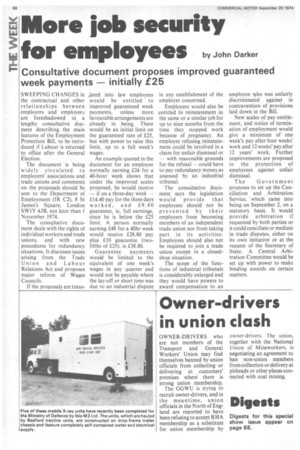More lob security
Page 70

If you've noticed an error in this article please click here to report it so we can fix it.
for employees by John Darker
Consultative document proposes improved guaranteed week payments — initially £25
SWEEPING CHANGES in the contractual and other relationships between employers and employees are foreshadowed in a lengthy consultative docment describing the main features of the Employment Protection Bill, to be introduced if Labour is returned to office after the General Election.
The document is being widely circulated to employers' associations and trade unions and comments on the proposals should be sent to the Department of Employment (IR C2), 8 St James's Square, London SW1Y 4JB, not later than I November 1974.
The consultative document deals with the rights of individual workers and trade unions, and with new procedures for redundancy situations. It discusses issues arising from the Trade Union and Labour Relations Act and proposes major reform of Wages Councils.
If the proposals are trans Jated into law employees would be entitled to improved guaranteed week payments, unless more favourable arrangements are already in being. There would be an initial limit on the guaranteed rate of £25, but with power to raise this limit, up to a full week's wages.
An example quoted in the document for an employee normally earning £24 for a 40-hour week shows that under the improved scales' proposed, he would receive — if on a three-day week — £14.40 pay for the three days worked, and £9.60 guarantee, ie, full earnings, since he is below the £25 limit. A person normally earning £48 for a 40hr week would receive £28.80 pay plus £10 guarantee (twofifths of £25), ie £38.80.
Guarantee payments would be limited to the equivalent of one week's wages in any quarter and would not be payable where the lay-off or short time was due to an industrial dispute in any establishment of the employer concerned.
Employees would also be entitled to reinstatement in the same or a similar job for up to nine months from the time they stopped work because of pregnancy. An employer refusing reinstatement could be involved in a claim for unfair dismissal or with reasonable grounds for the refusal — could have to pay redundancy money as assessed by an industrial tribunal.
The consultative document says the legislation would provide that employees should not be prevented by their employers from becoming members of an independent trade union nor from taking part in its activities. Employees should also not be required to join a trade union except in a closedshop situation.
The scope of the functions of industrial tribunals is considerably enlarged and they would have powers to award compensation to an employee vyto was unfairly discriminated against in contravention of provisions laid down in the Bill.
New scales of pay entitlement, and notice of termination of employment would give a minimum of one week's pay after four weeks' work and 12 weeks' pay after' 12 years' work. Further improvements are proposed in the protection of employees against unfair dismissal.
The Government proposes to set up the Conciliation and Arbitration Service, ' which came into being on September 2, on a statutory basis. It would provide arbitration if requested by both parties or it could conciliate or mediate in trade disputes, either on its own initiative or at the request of the Secretary of State. A Central Arbitration Committee would be set up with power to make binding awards on certain matters.




































































































































































































































































































































































